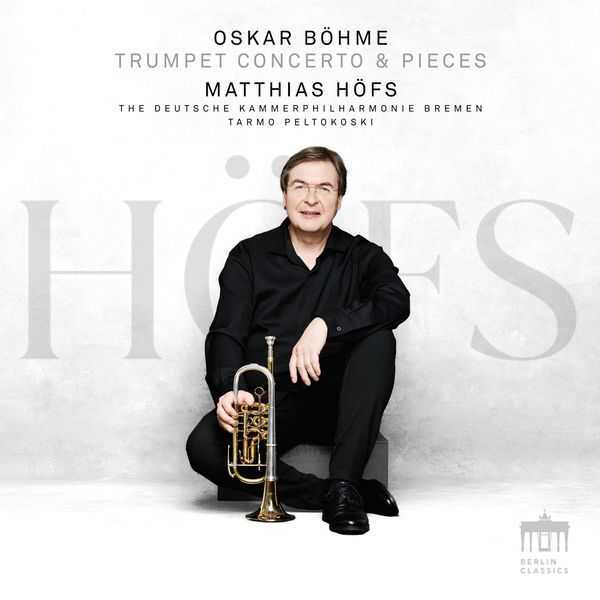

Composer: Oskar Böhme
Performer: Matthias Höfs
Orchestra: Deutsche Kammerphilharmonie Bremen
Conductor: Tarmo Peltokoski
Format: FLAC (tracks)
Label: Berlin Classics
Catalogue: 0302814BC
Release: 2022
Size: 491 MB
Recovery: +3%
Scan: cover
Trumpet Concerto, Op. 18
01. I. Allegro moderato
02. II. Adagio religioso. Allegretto
03. III. Rondo. Allegro scherzando
04. Entsagung, Op. 19
05. Soirée de St. Petersbourg, Op. 23
06. Danse Russe, Op. 32
07. Liebeslied, Op. 22, No. 2
08. La Napolitaine, Tarantella, Op. 25
Trompeten-Sextett, Op. 30
09. I. Adagio ma non tanto. Allegro molto
10. II. Scherzo. Allegro vivace
11. III. Rondo. Allegro scherzando
12. IV. Allegro con spirito
The tragic fate of composer Oskar Böhme long went unresearched. His music suffered a similar fate. On this album, the trumpeter Matthias Höfs is joined by The Deutsche Kammerphilharmonie Bremen in a performance of his most ambitious works that aims to win a hearing both for his striking and sensitive music and for the story of his life.
The Trumpet Concerto – which is the only Romantic 19th-century concerto for trumpet – is presented here in Matthias Höfs’s own orchestration. It is a challenging work that holds the attention with its dramatic narrative and powerful cadenzas.
The “pieces” on this album display the full stylistic spectrum of Böhme’s oeuvre. Entsagung is memorable for its soft tone colours that admirably bring out its restrained sorrow. Soirée de St. Petersbourg evokes the image of the city at night with its illuminated palaces and glittering canals. His Russian Dance is heard on this album in a version for mixed ensemble. The musical language that pervades this piece illustrates Böhme’s fateful affinity with his adopted homeland. The furious haste of La Napolitaine, Tarantella once again proves the capability of the fully fledged trumpeter. The ambitious Trumpet Sextet in E-flat minor brings to a close our journey through selected works of Oskar Böhme.
For many years little or no information was available about the composer. Oskar Böhme was born into a family of musicians near Dresden in 1870; he studied in Germany and Hungary and then emigrated to Russia, where he even changed his nationality in order to improve his chances of a place in one of the great orchestras. Despite his efforts to achieve perfect integration into Russian society, his German origins proved fateful when the Bolsheviks seized power – after years of persecution, he was executed for “anti-Soviet activities” on October 3, 1938.



